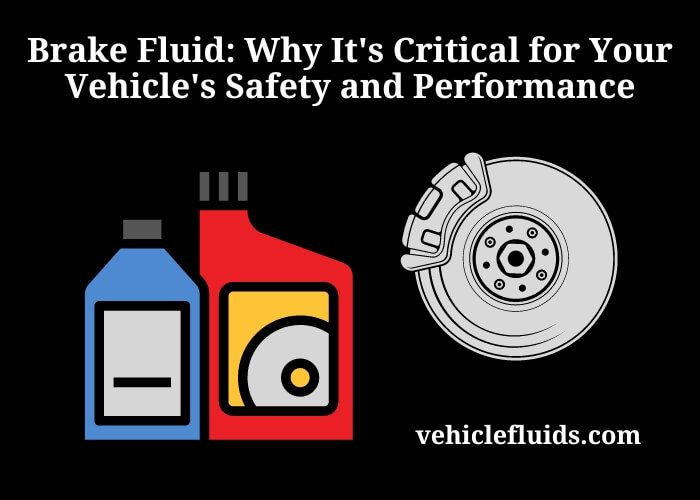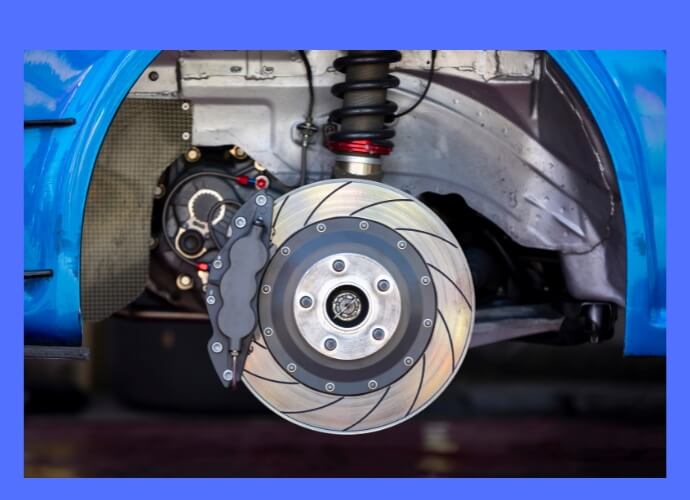The braking system is one of the most important systems in a vehicle, and brake fluid is an integral part of that system. Without brake fluid, the braking system would not be able to function correctly. It’s a hydraulic fluid that plays a critical role in transferring force from the brake pedal to the brake calipers or drums. As such, it’s essential to understand why brake fluid is so important and how it can affect your vehicle’s safety and performance.

Brake fluid is often overlooked when it comes to vehicle maintenance. Most drivers know to check their oil, tires, and windshield wipers regularly, but they may not realize that brake fluid is just as critical. Cold weather can be a real drag on vehicles, and checking your car’s oil is one of the most important maintenance tasks you need to do regularly. In fact, using contaminated or degraded brake fluid can be dangerous, potentially leading to brake failure and putting you and your passengers at risk.
What is Brake Fluid?
Brake fluid is a specially designed hydraulic fluid that plays a critical role in a vehicle’s braking system. It transfers force from the brake pedal to the brake calipers or drums, allowing the vehicle to come to a stop when the brakes are applied.
Brake fluid is typically made up of a combination of various glycols, ethers, and other additives that help it to perform its function effectively. These chemicals are designed to work together to provide a fluid that has high boiling points, low freezing points, and low compressibility. Brake fluid is also designed to be non-corrosive, non-conductive, and non-flammable, as well as resistant to oxidation and moisture.
Different Types of Brake Fluid and Their Properties
There are several types of brake fluid available on the market, and each has different properties that affect how it performs in a vehicle’s braking system. In this section, we’ll take a closer look at the three most common types of brake fluid: DOT 3, DOT 4, and DOT 5.1.
DOT 3 Brake Fluid
DOT 3 brake fluid is the most common type of brake fluid and is suitable for use in most vehicles. It has a minimum dry boiling point of 401°F (205°C) and a minimum wet boiling point of 284°F (140°C).
Dry boiling point refers to the boiling point of the fluid when it’s new and unused, while wet boiling point refers to the boiling point of the fluid after it has absorbed some moisture. DOT 3 brake fluid is compatible with most rubber brake components, making it a versatile choice.
DOT 4 Brake Fluid
DOT 4 brake fluid is similar to DOT 3, but it has a higher boiling point. It has a minimum dry boiling point of 446°F (230°C) and a minimum wet boiling point of 311°F (155°C).
This higher boiling point makes DOT 4 brake fluid ideal for high-performance vehicles that generate a lot of heat in their braking systems. However, it’s worth noting that DOT 4 brake fluid can be more corrosive than DOT 3, which can cause damage to some brake system components.
DOT 5.1 Brake Fluid
DOT 5.1 brake fluid is similar to DOT 4, but it has an even higher boiling point. It has a minimum dry boiling point of 500°F (260°C) and a minimum wet boiling point of 356°F (180°C). This makes it suitable for use in high-performance vehicles that generate even more heat than those that use DOT 4 brake fluid. However, like DOT 4 brake fluid, DOT 5.1 brake fluid can be more corrosive than DOT 3, which means it’s not compatible with some brake system components.
How does Brake Fluid Affect Safety and Performance?
Brake fluid is a critical component of a vehicle’s braking system, and it plays a significant role in both the safety and performance of the vehicle. In this section, we’ll take a closer look at how brake fluid affects safety and performance.

Safety
Brake fluid is responsible for transferring force from the brake pedal to the brake calipers or drums, which is what allows the vehicle to come to a stop. If the brake fluid is contaminated or degraded, it may not be able to transfer this force effectively, which can cause the brakes to fail. This can be dangerous and potentially lead to an accident.
Contaminated or degraded brake fluid can also cause problems with the brake system’s hydraulic components, such as the brake lines and calipers. Moisture in the brake fluid can cause the brake lines to corrode, which can lead to leaks and brake failure. Similarly, degraded brake fluid can cause the rubber seals in the brake system to deteriorate, which can lead to leaks and brake failure.
Performance
The performance of a vehicle’s brakes is directly related to the quality of the brake fluid. If the brake fluid is contaminated or degraded, it may not be able to perform as effectively as it should. For example, the boiling point of the brake fluid is critical because it determines how well the fluid can handle the heat. If the brake fluid boils, it can create air bubbles in the brake system, which can cause a spongy brake pedal and reduce braking performance.
The compressibility of the brake fluid is also critical. If the brake fluid is too compressible, it can cause a spongy brake pedal and reduce the overall effectiveness of the brakes. This can be dangerous, as it can lead to longer stopping distances and potentially cause an accident.
Brake fluid plays a critical role in the safety and performance of a vehicle’s braking system. It’s essential to check and maintain your brake fluid regularly to ensure it’s in good condition and performing as it should. If you notice any issues with your brakes, such as a spongy brake pedal or longer stopping distances, it’s important to have your brake system inspected by a qualified mechanic.
How to Check and Maintain Brake Fluid?
Checking and maintaining brake fluid is an essential part of keeping your vehicle’s braking system safe and performing well. In this section, we’ll take a closer look at how to check and maintain brake fluid.
Checking Brake Fluid
Checking the brake fluid level is a straightforward process that you can do at home. Here’s how to do it:
1. Locate the brake fluid reservoir under the hood of your vehicle. It’s typically located on the driver’s side of the engine compartment, near the back.
2. Clean the top of the reservoir to prevent dirt or debris from getting inside.
3. Check the fluid level by looking at the side of the reservoir. The fluid should be between the “minimum” and “maximum” lines on the side of the reservoir. If the fluid is below the “minimum” line, it’s time to add more brake fluid.
Maintaining Brake Fluid
Maintaining the quality of the brake fluid is just as important as maintaining the fluid level. Here are some tips for maintaining your brake fluid:
1. Change brake fluid every two years or as recommended by the vehicle manufacturer. Brake fluid can absorb moisture over time, which can lower its boiling point and reduce its effectiveness.
2. Always use the type of brake fluid recommended by the vehicle manufacturer. Using the wrong type of brake fluid can affect the performance of your brakes and potentially cause damage to your brake system.
3. Keep the brake fluid reservoir clean and free from debris. Dirt and debris can contaminate the brake fluid, causing it to degrade more quickly.
4. Have your brake system inspected regularly by a qualified mechanic. They can check the condition of the brake fluid, brake lines, calipers, and other components to ensure everything is working as it should.
Checking and maintaining your brake fluid is a crucial part of keeping your vehicle’s braking system safe and performing well. By following these tips, you can help ensure that your brakes are in good condition and ready to perform when you need them.
Conclusion
Brake fluid is a critical component of a vehicle’s braking system that plays a significant role in both the safety and performance of the vehicle. There are different types of brake fluid available, and it’s essential to use the right type for your vehicle to ensure the system functions correctly.
Regularly checking and maintaining your brake fluid is an essential part of vehicle maintenance. You should check the brake fluid level regularly and maintain the quality of the fluid by following the manufacturer’s recommendations. It’s essential to have your brake system inspected regularly by a qualified mechanic to catch any issues before they become a more significant problem.
So take the time to check your brake fluid regularly and have it maintained to keep your vehicle safe and performing well.
If you want to know how to choose the right automatic transmission fluid for your vehicle, Read the article to know this.
